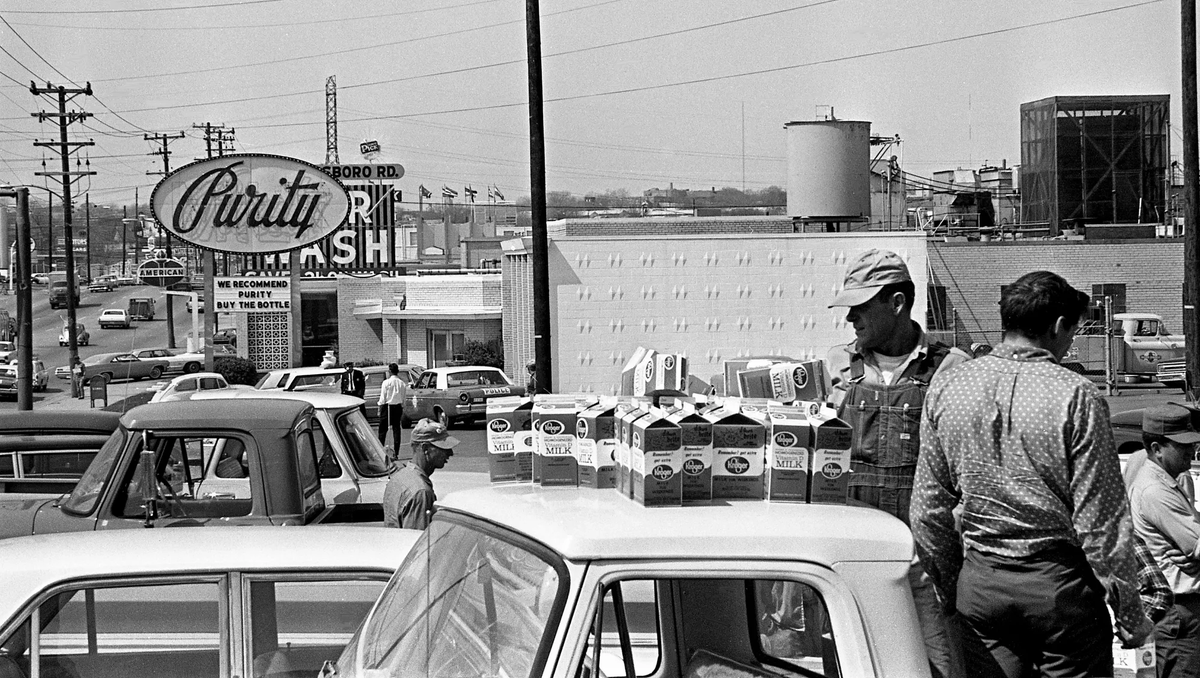Trader Joe's absolutely dominates grocery stores.
They earn ~$2,100 per square foot, which is more than 2x Whole Foods, and ~4.5x Walmart.
Put simply, they've created an experience that makes customers LOVE them.
Here's how:
They earn ~$2,100 per square foot, which is more than 2x Whole Foods, and ~4.5x Walmart.
Put simply, they've created an experience that makes customers LOVE them.
Here's how:

Trader Joe's began as Pronto Market in 1958.
Founder Joe Coulombe, the "Joe" in Trader Joe's, pivoted from Pronto Market to avoid a clash with the "800-pound gorilla" of convenience stores dominating the LA area: 7-Eleven.
AKA...TJ's (sorta) owes its existence to 7-Eleven.
Founder Joe Coulombe, the "Joe" in Trader Joe's, pivoted from Pronto Market to avoid a clash with the "800-pound gorilla" of convenience stores dominating the LA area: 7-Eleven.
AKA...TJ's (sorta) owes its existence to 7-Eleven.

In 1967, the first store opened in SoCal - the name was a nod to 1960s Tiki culture, a playful twist on Trader Vic's.
By 1979 TJ's sold to Aldi founder Theo Albrecht, kicking off a whirlwind of expansion, as Joe stayed as CEO for the next decade.
By 1979 TJ's sold to Aldi founder Theo Albrecht, kicking off a whirlwind of expansion, as Joe stayed as CEO for the next decade.

1988: Expansion accelerated from SoCal to NorCal.
1996: East Coast debut in Maryland.
Today: 500+ stores nationwide.
Their growth has been fueled by 4 deliberate tactics any brick-and-mortar entrepreneur can learn from.
Here they are:
1996: East Coast debut in Maryland.
Today: 500+ stores nationwide.
Their growth has been fueled by 4 deliberate tactics any brick-and-mortar entrepreneur can learn from.
Here they are:

🛒 QUALITY OVER QUANTITY 🛒
TJ's carries ~90% less SKU's than most stores.
They are RUTHLESS about product - if it isn't selling, it’s axed from the shelves.
This means nearly all the products in the store are high quality, avoid genericness, AND is under the TJ's brand.
TJ's carries ~90% less SKU's than most stores.
They are RUTHLESS about product - if it isn't selling, it’s axed from the shelves.
This means nearly all the products in the store are high quality, avoid genericness, AND is under the TJ's brand.

🛒 FOUCS ON CORE CUSTOMER 🛒
TJ'S knows their target customer: "yuppies"
AKA consumers in new cities -- specifically ones who are educated, but still very budget conscious.
This is why TJ's walks the tight rope of having an upscale vibe while providing budget friendly prices.
TJ'S knows their target customer: "yuppies"
AKA consumers in new cities -- specifically ones who are educated, but still very budget conscious.
This is why TJ's walks the tight rope of having an upscale vibe while providing budget friendly prices.

🛒 VIBES 🛒
TJ's "localizes" each store with decor like murals that are in the spirit of the city of the store.
They avoid corporate vibes with subtle touches like handwritten price tags.
They even have unique local bags as shopping souvenirs, which fans hunt as collectibles!
TJ's "localizes" each store with decor like murals that are in the spirit of the city of the store.
They avoid corporate vibes with subtle touches like handwritten price tags.
They even have unique local bags as shopping souvenirs, which fans hunt as collectibles!

🛒 INVESTS IN EMPLOYEES 🛒
TJ's doesn't spend any money on marketing or e-commerce (they have zero online presence), allowing them to pay employees better.
Pay, insurance, and retirement benefits are above industry standards.
In 2019, Forbes named TJ's America’s best employer!
TJ's doesn't spend any money on marketing or e-commerce (they have zero online presence), allowing them to pay employees better.
Pay, insurance, and retirement benefits are above industry standards.
In 2019, Forbes named TJ's America’s best employer!

The result of these tactics might be a bit counter-intuitive.
Less SKU's = less decisions for customers, leading to MORE purchases
It also means stores need much less real estate than competition..
Combined with industry leading employee pay...it's no wonder TJ's dominates💰
Less SKU's = less decisions for customers, leading to MORE purchases
It also means stores need much less real estate than competition..
Combined with industry leading employee pay...it's no wonder TJ's dominates💰

If you enjoyed this thread, I write about franchises + brick and mortar businesses.
Give me @franchisewolf a follow to catch them in your feed.
And feel free to like & retweet to share with others!
Give me @franchisewolf a follow to catch them in your feed.
And feel free to like & retweet to share with others!
I also write a newsletter for 42,000 franchise owners, operators, and investors:
wolfoffranchises.com/?utm_source=tw…
wolfoffranchises.com/?utm_source=tw…
TLDR - TJ's tactics:
🛒 Quality over quantity
🛒 Focus on core customer
🛒 Curated local vibes
🛒 Invests in employees
This results is a grocery store with the best products, lower operating costs, a beloved brand, and industry leading employee compensation!
🛒 Quality over quantity
🛒 Focus on core customer
🛒 Curated local vibes
🛒 Invests in employees
This results is a grocery store with the best products, lower operating costs, a beloved brand, and industry leading employee compensation!
• • •
Missing some Tweet in this thread? You can try to
force a refresh























